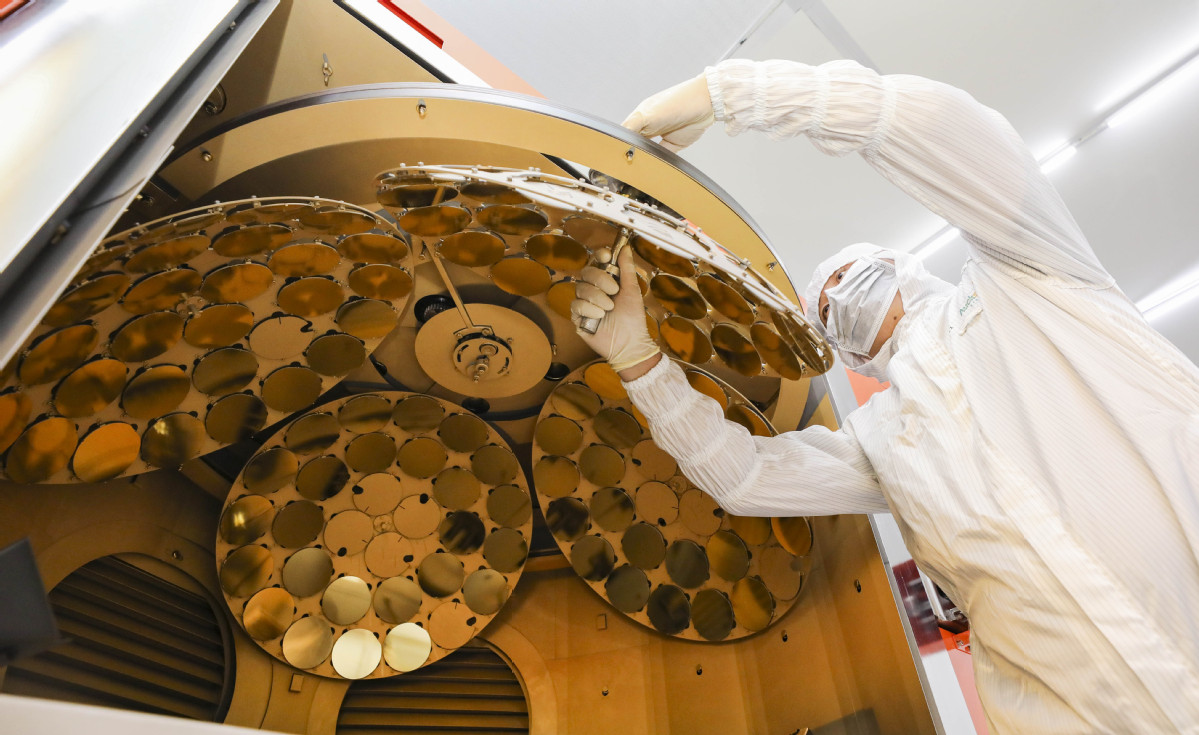Microchips are produced at a factory in Huai'an, Jiangsu province. [ZHAO QIRUI/FOR CHINA DAILY]
Xi Jinping, general secretary of the Communist Party of China Central Committee, has called on the nation to strengthen its basic research to consolidate self-reliance and strength in science and technology.
He made the remark on Tuesday when chairing the third group study session of the Political Bureau of the 20th CPC Central Committee.
Gong Qihuang, president of Peking University and an academician of the Chinese Academy of Sciences, introduced the development of basic research at the study session, and made suggestions on related work, according to a statement released on Wednesday.
Addressing the group study session, Xi said that strengthening basic research is an urgent requirement for achieving greater self-reliance and strength in science and technology, and it is the only way to build China into a global scientific and technological powerhouse.
Planning on basic research should be strengthened in a forward-looking, strategic and systemic manner, he said, adding that efforts should be made to integrate cutting-edge technologies with the country's major strategic needs and the goals of socioeconomic development.
He called for boosting China's strategic strength in science and technology and giving full play to the role of national laboratories, research institutions, high-level research universities and leading scientific and technological enterprises.
Xi urged coordinated efforts to build research centers for basic disciplines and deploy a new basic platform for scientific research based on information technology in order to form a strong basic research network.
Redoubled efforts should be made to enhance the domestic development of scientific and technological apparatus and equipment, operating systems and basic software, he said, adding that scientific research institutions, universities and enterprises are encouraged to carry out joint research to raise the level of domestically developed technologies and enlarge the scale of their applications.
Xi stressed the early realization of using China's independent research platforms, apparatus and equipment to solve major problems in basic research.
He has on many occasions underlined the importance of basic research in strengthening China's self-reliance in the field of science and technology, against the backdrop that the United States has attempted to suppress the nation's technological development in recent years.
When delivering a report to the 20th CPC National Congress in October, Xi said: "To meet China's strategic needs, we will concentrate resources on original and pioneering scientific and technological research to achieve breakthroughs in core technologies in key fields. … We will strengthen basic research, prioritize original innovation and encourage researchers to engage in free exploration."
Speaking at Tuesday's study session, Xi stressed leveraging the role of institutional and policy support and advancing institutional reforms to boost the development of basic research.
He said that financial investment in basic research should be expanded steadily, and enterprises should be encouraged to increase their investment in this field through various methods such as tax incentives, and called for measures to encourage further financial input into the field through means such as scientific funds and donations.
Xi also called for building a platform for international cooperation in basic research, setting up a global fund for scientific research, and developing joint research with international institutions on global problems in the fields of climate change, energy security, biosecurity and the utilization of outer space.
Greater efforts should be made to participate in global scientific and technological governance, and to join or launch international scientific and technological organizations, he added.
Chinese scientists hailed Xi's remarks at the group study session.
Tang Benzhong, a noted chemist and an academician of the Chinese Academy of Sciences, said that "the spring for scientists in basic research" would come if the ideas highlighted in Xi's speech were effectively implemented.
"The source for innovations lies in basic sciences. Only by increasing our capabilities in basic research can we seize new opportunities in technological development," Tang said.
"China now has a massive research budget and workforce. It is fully capable of providing sustained support for researchers to proactively push the envelope of basic sciences," Tang added.
Zhan Renbin, director of the Chinese Academy of Sciences' Nanjing Institute of Geology and Palaeontology, said that he and his colleagues were strongly motivated by Xi's speech highlighting the importance of basic research in China's pursuit of high-quality self-sufficiency in science and technology.
"Basic research typically takes a long time to produce results. If we want to make breakthroughs, we have to be able to endure solitary hardship, while keeping a close eye on the global frontier of science," Zhan said. "Through innovations and experiments, we will work hard and fulfill our duty."
China's total expenditure on research and development reached 3.09 trillion yuan ($448.2 billion) last year, surpassing 3 trillion yuan for the first time and cementing itself as the world's second-largest R&D spender.
Last year, China spent 195.1 billion yuan on basic research, which was 3.9 times the figure in 2012.
Source:
China Daily
Written by:
Cao Desheng, Zhang Zhihao
